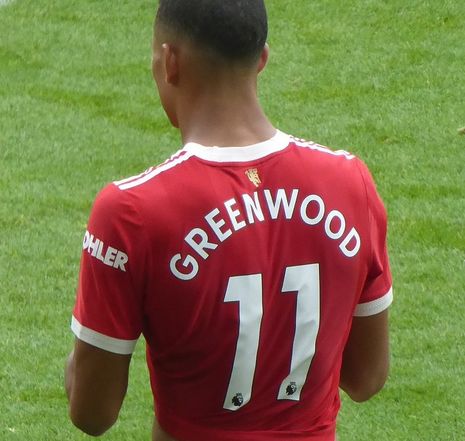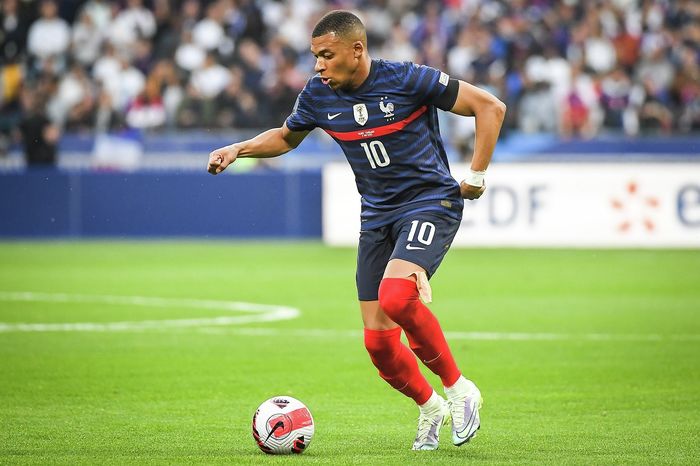Greenwood’s United departure is a blatant exhibition of football sexism
Manchester United made the right decision on Greenwood’s future at the club, but not for the right reasons

“You have the power to convince us men what we have to do and what we don’t have to do,” was the feminist message spread by FIFA president Gianni Infantino on the eve of the World Cup final. Soon after, Mason Greenwood moved to the La Liga club Getafe following an internal investigation by his club Manchester United into allegations of sexual and physical violence raised by his partner.
The decision was surprising. Football is not usually a place where those accused of violence against women suffer professional consequences. David Goodwillie, who was declared a rapist in a civil case, was made captain by Clyde after the decision, and then signed by Raith Rovers, which led to the en masse resignation of their women’s team. Yves Bissouma was signed by Spurs while under investigation for sexual assault. Greenwood, charged with but never tried on counts of assault, attempted rape and coercive and controlling behaviour, looked dangerously close to getting off scot-free.
Happily, he will not play for Manchester United again. Such an outcome was no doubt affected by the higher publicity surrounding Greenwood’s case. His alleged victim released horrendous images of her injuries on social media and released an audio clip disgusting enough to turn the stomach of anyone with basic humanity. United’s decision is a vindication of those who were morally outraged by it, both on social media and off it. However, United’s behaviour in this case is not a sign of their commitment to the rights of women and girls, nor a sign of their “power” as Infantino might claim.
The announcement that Greenwood would be leaving the club was joined by a statement by the club’s CEO Richard Arnold. In it, Arnold announces that Greenwood did not commit the offences which he was charged with, while also acknowledging that United did not have access to all the available evidence. United appear to have acted as both judge and jury in this case, declaring Greenwood innocent, a position which has not been proven in a court of law. If there was incontrovertible evidence that Greenwood did not commit the allegations against him, United would surely keep him. If what United had seen was enough to prove his innocence in their eyes, it should be enough to convince the public. The club’s statement did admit that Greenwood had made mistakes. What these were was not revealed, but one of them was surely being a horrible human being. Clearly, whatever the legal case, there is no moral argument for keeping Greenwood at the club.
All United’s supposed certainty is academic in light of today’s decision, but the way that the club has handled the investigation into Greenwood’s conduct has been sexist. The suggestion that they would shift part of the decision-making process onto the women’s team subjected their own players to vile misogyny at the hands of some of the club’s fans. What “power” could Ella Toone, Katie Zelem and Mary Earps ever have in such a decision, inevitably made by the club’s non-footballing management? Was their power to persuade men evident when their Instagram comments included such sentiments as “allow Greenwood back”? United’s actions did not empower women — they scapegoated them.
Manchester United’s prevarication and the contempt in which they held their female players and fans during this process shows that women in football are not held back by a lack of desire to open doors. Sexism is embedded at the very highest levels of football. Regardless of the success of the World Cup, the game is not equal. The events of recent days show it may not ever be.
 News / Cambridge academics stand out in King’s 2026 Honours List2 January 2026
News / Cambridge academics stand out in King’s 2026 Honours List2 January 2026 Interviews / You don’t need to peak at Cambridge, says Robin Harding31 December 2025
Interviews / You don’t need to peak at Cambridge, says Robin Harding31 December 2025 Comment / What happened to men at Cambridge?31 December 2025
Comment / What happened to men at Cambridge?31 December 2025 News / Varsity’s biggest stories of 202531 December 2025
News / Varsity’s biggest stories of 202531 December 2025 Features / “It’s a momentary expression of rage”: reforming democracy from Cambridge4 January 2026
Features / “It’s a momentary expression of rage”: reforming democracy from Cambridge4 January 2026










